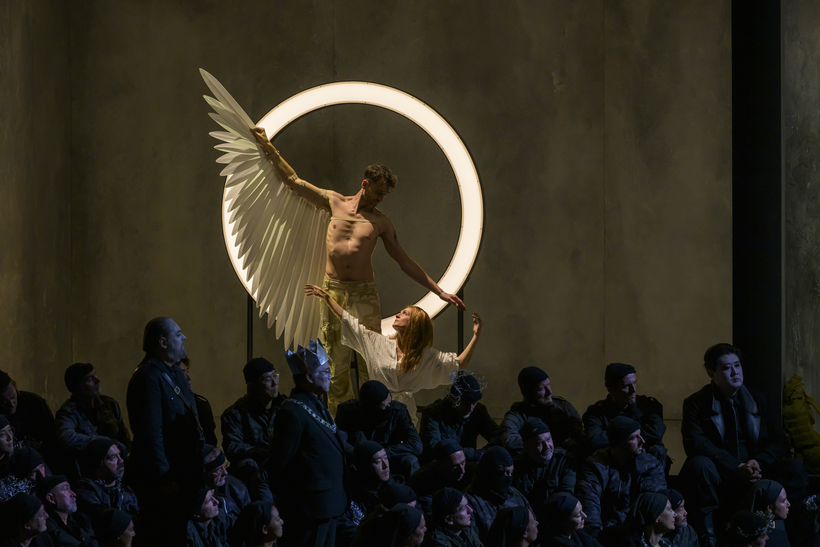When a dramatic character starts mouthing another character’s lines, the director is making a point, as at the top of Kirill Serebrennikov overstuffed Lohengrin for the Opéra Bastille. By the banks of the river Scheldt, the orphaned Lady Elsa of Brabant stands accused of fratricide. Just when all seems lost, a white knight materializes in a skiff drawn by a magnificent swan, to which—first things first—the knight bids a loving farewell. Rapt, the accused lip-syncs along. In her dreams, she has seen this movie before. If only she had a clue how it ends.
Filmed live during its premiere run in the fall of 2023, the production marked its director’s debut with the Paris company. An activist filmmaker and theater director long subjected by the Kremlin to Kafkaesque show trials and capriciously imposed house arrest, the 55-year-old Serebrennikov now resides in Western Europe amid an intelligentsia that thinks he walks on water. Le Figaro hailed his Lohengrin at the Bastille “one of the most gripping shows seen at the Opéra in a long time.”

High praise indeed for a brutalist industrial-scale blockbuster awash in dystopian clichés. For starters, Serebrennikov transposes Wagner’s chivalric romance to a contemporary military trauma center, where live action and gritty black-and-white video spill across interconnecting cells and halls littered with body bags and heavily populated with amputees.
Poor convulsive Elsa is assigned to the psych ward, along with not just one double but two who act out a lot, flinging their limbs, scribbling on walls, and fussing with wearable wire-craft projects. The massive inventory of gratuitous props further includes a mobile LED donut, insectile space helmets, and a full-leg prosthesis for the guardian Elsa’s father meant her to marry—a symbolic flourish as crushing as it is meaningless.

Amid the distractions, the cast mostly manages to keep their heads screwed on good and straight. The tenor Piotr Beczała, prized above all for dependability, modulates timbre and projection for a richly three-dimensional portrait of Lohengrin’s bewildering contradictions. As Elsa, the soprano Johanni van Oostrum artfully conveys abandonment and fragility in phrases that are transparent and secure. As Telramund, who is a good guy gone wrong, Wolfgang Koch turns his weathered bass baritone to dramatic advantage; as the witch Ortrud, who wraps Telramund around her little finger, the mezzo-soprano Ekaterina Gubanova is his polished foil. Alexander Soddy conducts with a masterly hand, as alive to the score’s crisp pomp as to its oases of radiance and coils of serpentine evil.
As noted, the show lays war imagery on with a heavy hand. In fairness, Lohengrin does have something to do with war, but not much. Happily, Serebrennikov has some bandwidth left over for the crucial motif of the swan. In fairy-tale fact, the bird is none other than Elsa’s missing brother, a victim of Ortrud’s soul-murdering arts. Serebrennikov visualizes the lad as a wiry pair of shirtless infantrymen, each brandishing one seraphic wing—and oh, how it stings to see what’s left of him when it’s all over.
Lohengrin is available for streaming on the Paris Opera Play and medici.tv
Matthew Gurewitsch writes about opera and classical music for AIR MAIL. He lives in Hawaii

